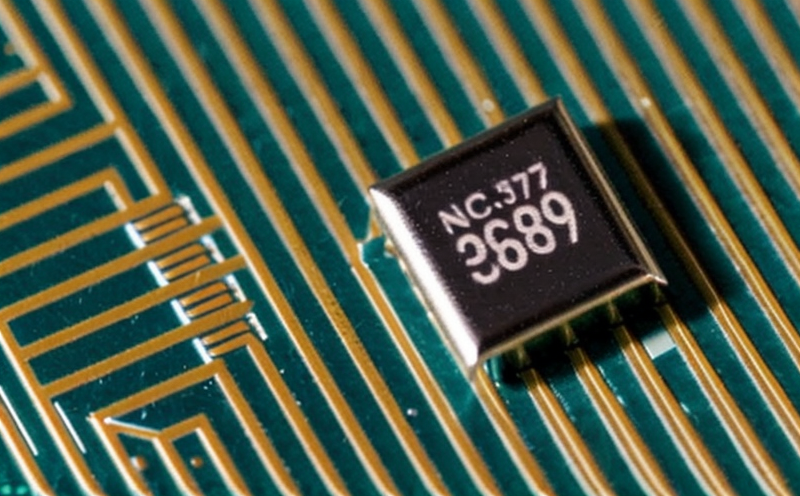JEDEC JESD22-A149 Microchip Power Integrity Lifetime Testing
The JEDEC JESD22-A149 standard is a critical component in the evaluation of microchips, especially those operating under high-power conditions. This testing ensures that the chips can withstand prolonged operational stress without degradation, which is essential for reliable performance and longevity. The primary aim is to simulate real-world power supply variations and thermal cycling scenarios that the chip will encounter during its lifetime.
The testing protocol outlined in JESD22-A149 involves a series of rigorous steps aimed at emulating the operational stresses that a microchip might face over its expected life span. This includes simulating conditions such as varying supply voltages, current surges, and temperature cycling. The goal is to identify any potential weaknesses or vulnerabilities in the chip's design that could lead to failure under real-world operating conditions.
Our testing facility uses state-of-the-art equipment to replicate these environmental stresses accurately. The setup includes high-precision power supplies capable of delivering variable voltage and current, as well as thermal chambers designed to simulate extreme temperature ranges. By subjecting the microchips to these controlled environments, we can assess their reliability under stress conditions.
The testing process is not just about endurance; it's also about understanding how different parameters interact with each other. For instance, a change in supply voltage might affect the chip’s thermal performance, which in turn could influence its overall lifespan. Our engineers meticulously monitor these interactions to provide comprehensive insights into the microchip's behavior under stress.
One of the key aspects of this testing is the emphasis on real-world applicability. By using actual power supply conditions and environmental factors encountered in various sectors such as automotive, aerospace, and consumer electronics, we ensure that the results are relevant and actionable. This approach helps manufacturers to identify potential issues early in the development process, allowing for timely corrections and improvements.
The testing methodology is designed to meet the stringent requirements of international standards like JESD22-A149. Compliance with these standards not only ensures quality but also enhances credibility in the market. By adhering strictly to these guidelines, we provide clients with a reliable assurance that their products meet the necessary benchmarks for reliability and performance.
Our laboratory has successfully conducted numerous tests under this protocol, demonstrating our expertise in delivering accurate and consistent results. The data generated from these tests is invaluable for quality managers and compliance officers who need to ensure product integrity. For R&D engineers, it offers a crucial tool for innovation and improvement. For procurement teams, it provides the confidence needed to select reliable suppliers.
Moreover, this testing not only helps in identifying potential weaknesses but also aids in optimizing chip design for better performance under various conditions. This comprehensive approach ensures that the microchips are not just functional but robust enough to withstand the challenges they will face throughout their operational lifecycle.
Scope and Methodology
The scope of JESD22-A149 testing is broad, encompassing a variety of parameters that simulate real-world operating conditions. The methodology involves several key steps:
- Setup Configuration: Each microchip is configured with specific power supply settings and environmental controls to replicate operational stress.
- Power Supply Variations: Simulating different voltage levels and current surges to assess the chip's resilience under varying conditions.
- Thermal Cycling: Subjecting the chips to extreme temperature changes, mimicking the thermal environment they may experience in use.
- Data Collection: Monitoring critical performance metrics during testing to evaluate reliability and identify potential issues.
The detailed setup ensures that every aspect of power integrity is thoroughly examined. By adhering strictly to JESD22-A149, we provide clients with a robust framework for ensuring the longevity and reliability of their microchips.
Customer Impact and Satisfaction
The impact of our JEDEC JESD22-A149 testing is significant, directly influencing customer satisfaction by providing unparalleled assurance of product quality. Our clients benefit from a comprehensive understanding of how their products will perform under stress conditions, which helps in making informed decisions.
- Enhanced Quality Assurance: By identifying potential issues early, our tests help prevent costly rework and recalls.
- Informed Decision-Making: Clients can leverage the detailed insights gained from our testing to improve product design and manufacturing processes.
- Market Trust: Compliance with international standards boosts market confidence, enhancing brand reputation.
The satisfaction of our clients is paramount. We work closely with them to ensure that their specific requirements are met, providing a tailored approach to testing. This collaborative process ensures that the results are not only reliable but also aligned with customer expectations.
Competitive Advantage and Market Impact
The competitive advantage of adhering to JESD22-A149 standards is substantial, offering a clear edge in the market. Our testing ensures that products meet stringent reliability benchmarks, setting them apart from competitors who may not have undergone such rigorous scrutiny.
- Market Leadership: By providing reliable and robust microchips, we help our clients achieve market leadership positions.
- Customer Loyalty: Satisfied customers are more likely to remain loyal, fostering long-term relationships.
- Innovation Facilitation: Our testing supports continuous improvement, driving innovation in product design and development.
The impact extends beyond individual clients; it contributes positively to the industry as a whole. By setting high standards for reliability and performance, we promote a culture of excellence that benefits all stakeholders involved in semiconductor manufacturing and microchip technology.





